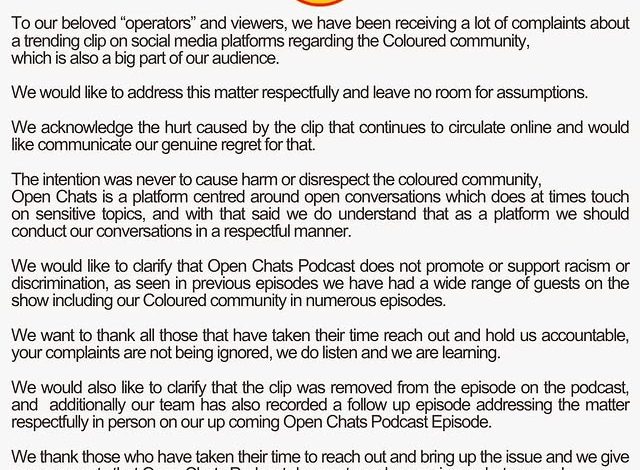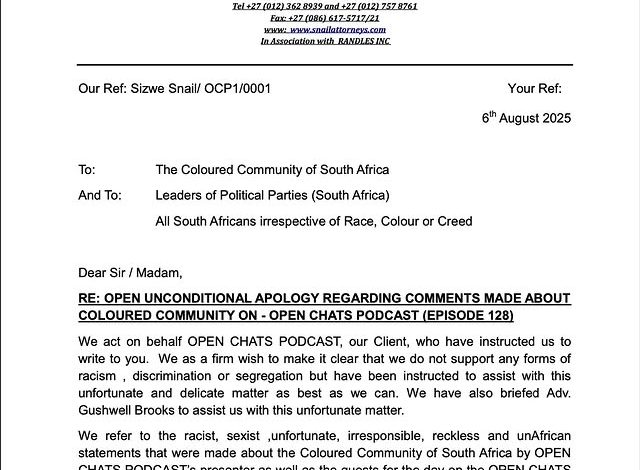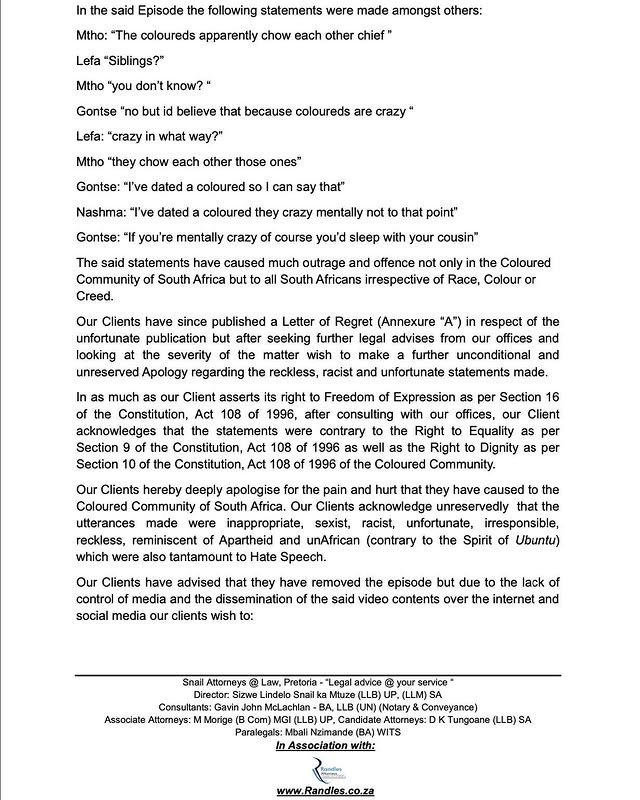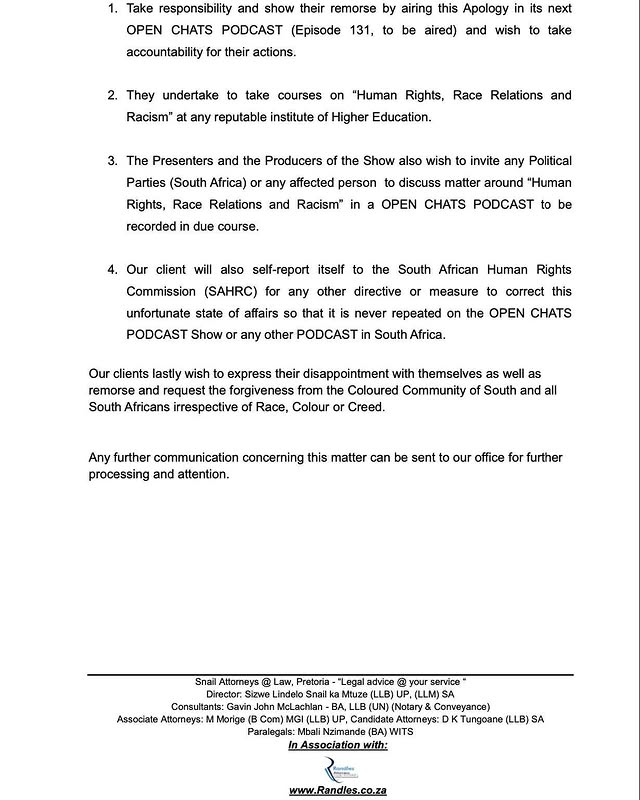Podcast in Hot Water: Gayton McKenzie Announces Legal Action Over Alleged Racist Comments

In August 2025, a major controversy erupted surrounding the Open Chats podcast after its hosts made deeply offensive and racist remarks about the Coloured community in South Africa. The comments sparked national outrage and prompted Gayton McKenzie, leader of the Patriotic Alliance (PA), to announce legal action against the podcasters.

ALSO READ: Minnie Dlamini Takes Legal Action Against MacG and Sol Phenduka in R2.5m Lawsuit
Table of contents
- What Happened on the Open Chats Podcast?
- Gayton McKenzie’s Response
- Broader Public and Civil Society Reaction
- The Open Chats Podcast’s Apology and Follow-up Actions
- Legal Lens: The Podcast’s Apology
- South African Law on Hate Speech, Discrimination, and Racism
- The Role of the Broadcasting Complaints Commission in South Africa
- Why This Incident Matters
- Consequences
What Happened on the Open Chats Podcast?
A clip from an episode of Open Chats featured the podcast hosts making derogatory statements about the Coloured community. Among the accusations were claims of incestuous relationships within coloured families and assertions that coloured people are “crazy.” These harmful stereotypes provoked immediate backlash across social media and civil society.
Due to the public outcry, the Open Chats podcast issued a public apology. They expressed regret for the hurt caused and stated that their platform focuses on open dialogue about sensitive subjects. The controversial clip has since been removed from the episode.
Gayton McKenzie’s Response
Gayton McKenzie, a prominent political figure and PA leader, took a strong stance on the issue. He condemned the remarks as racist and unacceptable. McKenzie instructed his party’s legal team to prepare a comprehensive response aimed at holding the podcasters accountable. He emphasised that such rhetoric normalises discrimination and should not be tolerated under any circumstances.
In a public message, McKenzie declared:
I want us to use everything at our disposal. It’s racism. We must never allow people to become that comfortable. If those remarks about the coloured community were directed at any other group, it would be front-page news.
He vowed to take legal action against the show and the individuals responsible in their personal capacities.
Broader Public and Civil Society Reaction
The incident drew condemnation beyond McKenzie and his party. Civil society organisation Cape Forum condemned the podcast’s remarks, calling for an urgent investigation by the South African Human Rights Commission (SAHRC). Cape Forum’s executive chairperson highlighted that the toxic rhetoric perpetuates damaging stereotypes that marginalise the coloured community further.
The Democratic Alliance (DA) also reported the podcast to the SAHRC, underscoring the political sensitivity and wide concern over the issue.
Public reaction on social media included calls to cancel the podcast and demands for accountability, reflecting a widespread rejection of racial vilification in media platforms.
The Open Chats Podcast’s Apology and Follow-up Actions
The Open Chats podcast team apologised publicly and acknowledged that they should maintain respect while discussing sensitive topics. They denied intentionally promoting racism or discrimination and noted that the coloured community forms a significant part of their audience.

The podcast hosts committed to producing a follow-up episode addressing the incident more thoughtfully. They have also removed the offending content from their platform in response to the backlash.
Legal Lens: The Podcast’s Apology



South African Law on Hate Speech, Discrimination, and Racism
South Africa’s legal framework strongly protects human dignity and promotes equality, particularly through its Constitution and associated legislation. Section 9 of the Constitution of the Republic of South Africa, 1996, guarantees equality before the law and explicitly prohibits unfair discrimination on grounds such as race, ethnicity, gender, religion, and others.
A key statute supporting this is the Promotion of Equality and Prevention of Unfair Discrimination Act, 2000 (PEPUDA), commonly known as the Equality Act. It prohibits both unfair discrimination and hate speech, and it allows individuals to approach Equality Courts for relief. Under Section 10 of PEPUDA, hate speech is defined as publishing, propagating, advocating, or communicating words based on one or more prohibited grounds (such as race or ethnicity) that could reasonably be construed to demonstrate a clear intention to be hurtful, harmful, or to incite harm or promote hatred.
The South African Human Rights Commission (SAHRC) is constitutionally empowered to investigate complaints relating to human rights violations, including hate speech and racism. It may refer matters to the Equality Court or, in severe cases, recommend criminal prosecution. These legal protections underpin actions like those taken by Gayton McKenzie and the Patriotic Alliance, aiming to hold media platforms and individuals accountable for racist and harmful speech.
The Role of the Broadcasting Complaints Commission in South Africa
The Broadcasting Complaints Commission of South Africa (BCCSA) plays a vital role in regulating broadcasting content to ensure it upholds ethical and legal standards. Established as an independent tribunal, the BCCSA provides a platform for the public to lodge complaints about broadcasts they find offensive, harmful, or discriminatory. It adjudicates these complaints according to the Broadcasting Code of Conduct, balancing freedom of expression with the protection of human dignity, privacy, and public interest.
The BCCSA enforces standards that require broadcasters to avoid hate speech, racism, and unfair discrimination, and it can sanction broadcasters who breach these rules. By promoting responsible and respectful media practices, the BCCSA helps ensure that content aired in South Africa supports social cohesion and respects the diverse communities of the country. This oversight complements legal frameworks addressing hate speech and discrimination, reinforcing accountability for broadcasters and content creators.
Why This Incident Matters
This situation highlights ongoing challenges with racism and harmful stereotypes in South African media and society. Commentary targeting the Coloured community, one of the country’s diverse and historically marginalised groups, must be handled responsibly to avoid deepening divisions or perpetuating discrimination.
Gayton McKenzie’s legal approach signals a push for stronger consequences against hate speech and racial vilification. It underscores the demand for media platforms to commit to ethical standards that foster respect and unity across communities.
CHECK OUT: Shaping the Future of Gauteng: A Conversation on Digital Trends, Youth Empowerment, and Smart Travel
Consequences
The PA’s legal team is preparing steps to pursue action against the podcast hosts. McKenzie has promised a report outlining the legal options and plans to inform party members and the public about the response. Meanwhile, investigations by bodies like the SAHRC may lead to further scrutiny or penalties in line with South African law.
This case serves as a critical reminder of the power of public discourse and the responsibilities borne by content creators. It also reinforces the ongoing efforts needed to combat racism and promote social cohesion in South Africa.




